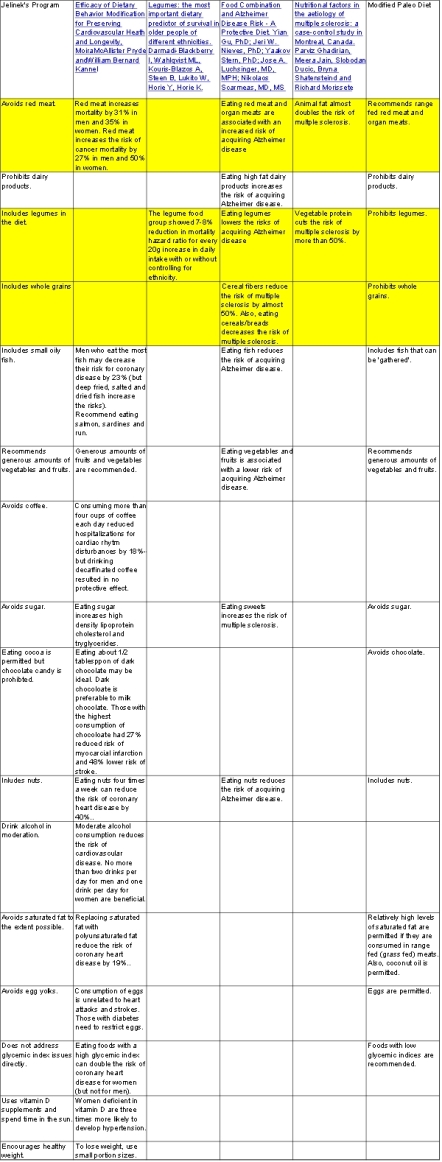Thinking like a scientist helps beat multiple sclerosis March 19, 2012
Posted by Rebecca Hoover in Diet - the right diet for MS, what you need to eat, Uncategorized.4 comments
Those of us who have been successful when following a lifestyle modification program for multiple sclerosis (MS) believe in our bones that healthy living effectively treats MS. After all, there does not seem to be any other way to explain going ten, twelve and even more years without a relapse once we start living ultra healthy. The recent study published by Professor George Jelinek, M.D., provides more scientific support for our views. While the study has its weaknesses (e.g., relying on self-reports of subjects rather than measures such as MRIs), most drug companies would be elated to offer any drug that could offer such great research results.If you haven’t read Jelinek’s new report, you can see it here: Remarkable five year follow up results of OMS retreats.
Moreover, the results of Jelinek’s new study are simply consistent with a plethora of research being published everyday by researchers all over the world. Increasingly it is apparent that nothing beats ultra healthy living in preventing disease–whether it be cardiovascular, liver, or neurological disease. It is interesting indeed that the very diet that helps treat MS helps prevent and treat heart and vascular disease as well as Alzheimer’s disease and dementia.
The following table probably shows why Jelinek’s OMS program has such good results–unlike other proposed MS ultra healthy living programs, it is based on solid research. For example, Jelinek’s program recommends avoiding red and organ meats which studies throughout the world are now showing contribute to heart disease, neurological problems and even early death. (As the table shows, studies have reported that red meat increases mortality by 31% in men and 35% in women, and red meat increases the risk of cancer mortality by 27% in men and 50% in women.) At the same time, Jelinek’s proposed diet includes legumes which studies show can contribute to extremely long lives. While the table includes only a few of many studies, it helps summarize the overall picture: Jelinek’s OMS program intelligently reflects the best of current scientific research.
All and all, many studies are showing the healthiest diet includes whole plant foods and fish–an abundance of fruits and vegetables, low glycemic foods, small oily fish (such as sardines and salmon), nuts, legumes and whole grains. At the same time, an ultra healthy diet excludes red and organ meats, large fish, and sweets. Jelinek’s proposed diet reflects these research findings to a “t”. In summary, Jelinek’s OMS approach contributes not only to neurological health but also to all around good health and vitality.
Please note that the table rows highlighted in yellow provide special alerts and comparisons for those with MS. As mentioned, the research quite consistently shows problems with red and organ meats for everyone and for those with MS. Likewise, research consistently shows benefits in eating legumes and whole grains–for everyone and for those with MS. While other programs for living with MS encourage eating of troublesome red meats and discourage eating of legumes, Jelinek’s OMS program both avoids meats and includes healthy legumes and grains. It is is this all around scientific approach that makes Jelinek’s OMS approach most helpful. When all is said and done, the research will likely show that Jelinek’s OMS program is the one that is most helpful for those with MS.
Many of the suggested diets for those with MS have much in common–all suggest eating generous amounts of vegetables, for example. Those that are suggesting eating red meat and organ meats while avoiding legumes are likely, however, to lead to problems. Even if eating red and organ meats worked for MS, early death from heart disease and Alzheimer’s disease becomes more likely when eating these foods. All in all, Jelinek’s programs makes sense! Bravo! As usual, we never have enough research. Let’s all push for this whenever we can.
A side benefit of an ultra healthy living program is that it will even help with the abs. While our friends may get rotunder and rotunder, we all soon become leaner than average. What’s not to like? Looking good has always been the fun part of adopting the OMS program.
Please let me know if you find my blog helpful. Please add a comment. What did you like? What would you like added? Thanks! Together we can change the way the world views MS. Please also join the Intelligent Guide to MS page on Facebook. I will use that page to make timely posts on new research and other issues likely to be of interest to others.
Please remember to consult your with doctors about how to stay as healthy as possible. Nothing here should be interpreted as medical advice. Instead, please use the information you find here in your discussions with your doctor.
Copyright 2012 Rebecca Hoover
A scientific multiple sclerosis (MS) diet keeps you looking young too October 23, 2010
Posted by Rebecca Hoover in Diet - the right diet for MS, what you need to eat.Tags: George Jelinek, MS Diet, Multiple Sclerosis, Swank Diet, Swank MS Diet
2 comments

Professor George Jelinek, M.D. and Professor Roy Swank, M.D. both suggest diets that will help you beat MS and wrinkles too. What could be better than that? Professor Jelinek has MS and is in his mid-50s in this picture but look much younger because he eats right. The same diet that is healthy for those with MS keeps you looking young.
If Professor George Jelinek, M.D., who has multiple sclerosis (MS) and who religiously follows an MS diet looks good in his mid-50’s, it is no accident. His science-based MS diet both helps beat MS and helps prevents aging and even wrinkles. It is no wonder Professor Jelinek, who is in his mid-50’s in the picture in this article, looks much younger than he is.
The extent to which an MS diet contributes to your good looks is apparent from a couple of studies. One study entitled Skin wrinkling: can food make a difference?, found that a diet rich in vegetables, olive oil, fish and legumes helps prevent wrinkling. This type of diet is the type of diet Professor Jelinek recommends for those with MS. In contrast, the study found that a high intake of meat, dairy and butter appears to contribute to wrinkling. The study also helpfully points out that prunes, apples and tea contribute 34% to the helpful variance in a good diet in preventing aging. (You can follow the link above to see the abstract for the study.)
Another study from Japan found something similar. Entitled Association of dietary fat, vegetables and antioxidant micronutrients with aging in Japanese women, this second study found yellow and green vegetables were especially helpful in preventing aging. (Again, you can follow the link above to see the abstract for the study.)
It seems we have a choice: We can have a healthy MS diet rich in legumes, fruit and vegetables, etc., and low in saturated fats and be youthful, or we can eat a junk food diet full of saturated fats and processed foods and be prematurely aged. It seems it is that simple.
When you are thinking about abandoning an MS diet because you miss junk food and saturated fats, it helps to remember the whole picture. Eating right is not only good for your health — it keeps you looking good too. Also, if you need to convince the kids in your family to eat right, you can point out that eating junk food will give you wrinkles and you just might end up looking like the Wicked Witch of the West.
Personally, I vote for feeling good, health and looking good. I hope you do too.
Please let me know if you find my blog helpful. Please add a comment. What did you like? What would you like added? Thanks! Together we can change the way the world views MS. Please also join the Intelligent Guide to MS page on Facebook. I will use that page to make timely posts on new research and other issues likely to be of interest to others.
Please remember to consult your with doctors about how to stay as healthy as possible. Nothing here should be interpreted as medical advice. Instead, please use the information you find here in your discussions with your doctor.
Copyright 2010 Rebecca Hoover
To beat multiple sclerosis, forget about grieving and be determined July 22, 2010
Posted by Rebecca Hoover in Diet - the right diet for MS, what you need to eat, Psychology and multiple sclerosis.9 comments

The determination needed to make the lifestyle changes needed to beat MS is about flexing some willpower. It is also about having a plan and tracking progress.
(This post was written for use on the wonderful website Overcoming Multiple Sclerosis of medical professor George Jelinek, M.D. I encourage you to visit that website too.)
Ever since, Dr, Elisabeth Kubler-Ross wrote about the five stages of grieving (denial and isolation, anger, bargaining, depression and acceptance), well-meaning advice givers have been advising those with multiple sclerosis (MS) to take time to grieve and to learn to cope with what is certain to be a difficult future ahead. If you have received this advice and are frightened half to death, it is helpful to remember there is plenty of hard evidence that this well-meaning advice is the worst advice any newly diagnosed person can get. Even if you have had MS for years, as I have, this advice is lousy.
If you want to beat MS, you are best off with a determined attitude not hopeless resignation. The evidence of the importance of determination comes from history — cases of real individuals who have had MS or other physical problems — and research evidence. You might be surprised at the extent to which a hopeless attitude contributes to unnecessary problems with MS. Below you will find some tips on avoiding this problem by overcoming fear.
My favorite historical examples of the importance of determination in overcoming a little adversity come from figures in United States public life: Franklin D. Roosevelt, Barbara Jordan and Paul Wellstone. Franklin D. Roosevelt was afflicted with polio and went on to become one of the most loved and effective presidents ever elected in the United States. If you need inspiration, reading biographies of Roosevelt and learning of the ways he used a stubborn iron will and compassion for others is inspirational. Barbara Jordan, a United States Congresswoman with MS was similarly inspiring. Afflicted with MS before most knew how to minimize the effects of MS, Barbara Jordan, who was African-American, used sheer willpower to focus on the abilities she did have to serve effectively and to help lead the fight for racial equality in the United States. Similarly, Paul Wellstone, a populist senator from Minnesota had MS but MS did not have him. A small man, perhaps 5’6” tall, Wellstone tackled an entrenched and wealthy conservative senator and changed Minnesota’s political landscape.
I have been inspired especially by the stories of Roosevelt and Wellstone many times, and, as I think about the silly advice to “take time to grieve” I think about how much poorer the world would be if Roosevelt, Wellstone and Jordan had not ignored such silly advice. Wellstone’s life is especially meaningful to me because he lived only a few miles from me and I encountered him many times. Never once did I see him talking about his MS or belaboring other health problems – instead he focused on helping solve the problems of others. For example, thanks to Paul Wellstone, health insurance policies in the United States must include coverage for mental health services. I also enjoyed watching him in action. This was true in part because Wellstone also focused on staying physically fit. Even with MS, he was muscular and was not above showing off his push ups.
The effectiveness of the coping strategies of these public figures is supported by actual scientific research. Research shows that avoiding fear and hopelessness is important to beating MS as are continued physical activity and intellectual effort.
One especially telling study found that there is relationship between actual MS disability and fears about MS fatigue and avoidance behavior. (For an abstract of this study see Fatigue and physical disability in patients with multiple sclerosis: a structural equation modeling approach.) This finding prompted researchers to warn that MS patients to avoid catastrophic thinking and to address avoidance behavior. In other words, we need to follow the example of our historical heroes and live boldly and with determination.
Similarly another study found that hopelessness and other ineffective coping strategies led to a worsening of MS fatigue. (For an abstract of this study, see The connection between coping mechanisms, depression, anxiety and fatigue in multiple sclerosis) Again, the study shows we are best off avoiding the well-meaning but silly advice about grieving and best off following the examples of our heroes. It is especially helpful to note that “emotional ventilation” or the continued moaning about MS symptoms and problems seems to merely aggravate depression and anxiety. It is one thing to share information about MS problems and to seek related solutions when needed, but it is another to dwell on these problems unnecessarily. Rather than this unhelpful dwelling on problems, a determined optimism is needed.
When all is said and done, heroes do not sit around and grieve on and on. Instead, they get determined. I personally did some grieving after I was diagnosed myself and accomplished nothing thereby except making a fool of myself. Instead of sitting around feeling sorry for myself, I could have been out having some fun and living a determined life. I certainly hope others manage to avoid this same mistake. My first neurologist made a determined effort to save me from this mistake (he even sent me to a psychologist) but nothing would dissuade me from my folly.
I could list here some of the many, many studies show that diet changes, physical exercise and intellectual stimulation are crucial in beating MS. Instead of doing that, however, I want to point out that determination is the key to making the life style changes needed to beat MS and then suggest some ways to overcome fear. Some of the best ways to overcome fear and a lack of determination are to;
- Read biographies and learn in detail about the lives of those who have lived very full lives despite having problems such MS or polio. The lives of those such as Roosevelt and Wellstone provide excellent examples of effective coping. At my most depressed times, I have read Roosevelt biographies and always found them helpful.
- Get exercise because exercise by itself alleviates hopelessness and depression.
- Stick to an MS diet because a healthy diet contributes to a feeling of vigor.
- Set impossibly high goals and go after them. The world has been changed by those who believed that the sky is the limit. It helps to adopt this attitude too.
- Resolve to be determined and celebrate stubbornness.
- Resolve everyday to make the life style changes needed to beat MS. Keep a journal of daily activities in support of a life style change plan.
- Resolve to find support, even if it is just on the Internet, for making life style changes.
- Reread Jelinek’s book and The Multiple Sclerosis Diet Book.
- Ask yourself if you would rather spend your life grieving unnecessarily or having some fun.
Our much beloved Dr. Roy L. Swank recognized the importance of determination long, long ago. In his book, The Multiple Sclerosis Diet Book, Swank thought the issue of determination was important enough that he talked about it on page 2. He said, “This [the Swank MS Diet] should be accompanied by adequate rest, a reduction of stress, and the adoption of a mental attitude that fosters optimism and a determination to live a satisfying life … .”
Later in the book, on page 43, Swank talks about the patients who are not sufficiently determined. He writes: “5. The patient’s spouse may now be working full-time and has the added responsibility of taking care of many household chores. Usually the family does not mind the added responsibility if the patient is also doing everything possible to maintain his or her health. The patient must stay on the diet and rest as directed. It’s frustrating for the family to be working hard knowing that the patient is not holding up his or her end of the bargain.” Swank actually used italics as shown here to emphasize his point. It is apparent from this that Swank thought those of us with MS have a responsibility to be determined and to do the best we can do. One can hardly disagree although I must admit to some cheating myself — more so when I was younger. I promise I am now much improved — especially now that I have given up my silly grieving!
As the writer of the Intelligent Person’s Guide to Beating MS, I know that others probably expect me to point out that following the advice I’ve written here will make you look drop dead gorgeous too. Indeed it will! Roosevelt, Jordan and Wellstone all looked quite dapper and could easily attract crowds in their days (of course, styles do change). We would all do well to follow much of their fine examples.
Our hero, George Jelinek, is, of course, an excellent role model too. Naturally he looks drop dead gorgeous. And he lives boldly and with determination. Many who have met Jelinek comment about his faithfulness to a healthy life style and his totally good looks. Julie Calder, who tells her story on my web site, is another good model – her life shows what some determination and life style changes can do in creating good health and producing a totally cute person. As for me, I am the reformed fool. Try to follow my good examples but not my folly.
Viva la healthy living and determination! And don’t forget the healthy life style that beats MS also makes you look your best. Move over Brad Pitt and Angelina Jolie.
Please help us all by writing lots of comments about this blog entry. Please write especially about what inspired you to make life style changes and what the results have been. Have your symptoms improved? How? What advice do you have for others? Please also share information on what or who inspires you to be determined when you are feeling depressed. Are there biographies or books you turn to for inspiration and would recommend for others?
Please let me know if you find my blog helpful. Please add a comment. What did you like? What would you like added? Thanks! Together we can change the way the world views MS. Please also join the Intelligent Guide to MS page on Facebook. I will use that page to make timely posts on new research and other issues likely to be of interest to others.
Please remember to consult your with doctors about how to stay as healthy as possible. Nothing here should be interpreted as medical advice. Instead, please use the information you find here in your discussions with your doctor.
Copyright 2010 Rebecca Hoover
Right diet may be the best way to beat multiple sclerosis and sizzle too June 17, 2010
Posted by Rebecca Hoover in Diet - the right diet for MS, what you need to eat.Tags: Add new tag, Hope, Jelinek, MS and Diet, MS Diet, Multiple Sclerosis, Multiple Sclerosis Diet, national ms society, Nutrition, Swank MS Diet
24 comments
If you have multiple sclerosis (MS) or know someone who does, there are many reasons to be optimistic. First, even members of Congress have had MS. Second, as each year passes, doctors and scientists learn more about what is needed to manage MS instead of having MS manage you. You may not be able to cure MS but most likely you can minimize it. Realistically, however, drugs are unlikely to make you well. To be as well as you can be, research shows an ultra healthy diet is needed.
Quite simply, the research shows that eating some foods is associated with the onset of MS and more MS symptoms and disability and other foods seem to help relieve MS symptoms. This is why a good MS diet is part of a modern science-based approach. And this ultra healthy MS diet will even make you more attractive!
Numerous studies have shown a relationship between diet and MS and point the way to a healthy diet for those with MS. Dr. Roy Swank, for example, a professor and neurologist at a university’s medical school in Oregon, found that eating too much saturated fat helps cause MS and makes MS worse. Other studies have found, MS is more frequent where Vitamin D deficiencies are common, when too much animal fat is consumed and even when too many sweets are eaten. At the same time, one study shows that eating whole grains and fruits and vegetables helps protect against MS.
Most important for those with MS, Dr. Swank studied the impact of diet on MS patients. He found that those who followed a low-fat, ultra healthy diet he planned, often lived normal lives. In fact, he wrote that 95% of patients who started following his diet shortly after diagnosis never became disabled. In contrast, he reported those who did not eat a healthy low-fat diet, often became disabled and died at a relatively young age.
Dr. Swank carefully defined what a low-fat diet is because he was so concerned about the impact of saturated fats on those with MS. His diet prohibits eating of more than 15 grams of saturated fats each day and recommends eating of only 20 to 50 grams of unsaturated fats each day. Of course, Dr. Swank’s diet also prohibits eating of any transfats, monoglycerides and diglycerides because the health problems caused by these are well known.
I believe I have no visible symptoms today because way back in 1990’s, I found information on Swank’s theories about a low-fat, ultra-healthy diet and started following his advice. (I take no drugs.) Best of all, you can try his advice on the Swank MS Diet and for free. You can borrow his classic book from your local library using an interlibrary loan if necessary. Otherwise, you can buy is book at a modest price at Amazon.com. His book is entitled The Multiple Sclerosis Diet Book by Roy Laver Swank. This book is so important for anyone with MS that it should be required reading. If you have MS, this is the first book to read. For refinements that update Swank’s work and will help you do even better, see Overcoming Multiple Sclerosis: An Evidence-Based Guide to Recovery by George Jelinek, M.D.
If the opportunity for better health is not enough to get you to try Dr. Swank’s diet for a few months, please consider this: his diet will make you look better than you have ever looked. When you start eating the right fats, taking fish oil, taking a few low-cost supplements, and eating fruits, vegetables and whole grains, you are going to be surprised at the difference in your appearance in a few months. Dr. Swank’s diet is precise, though, so be prepared to be precise when following it. Cheating is not a good idea.
An excellent web site that includes important information, including dietary recommendations prepared by a doctor, is Overcoming Multiple Sclerosis, prepared by Dr. George Jelinek who is also a professor of medicine. I love this web site and I highly recommend its use. Dr. Jelinek has MS himself and believes most can minimize MS symptoms with the right life style choices.
I also highly recommend Dr. Jelinek’s book on multiple sclerosis (mentioned above). A new version of this book, however, was published in February 2010 but was initially available only in Australia and New Zealand. Now, it is available in in much of the world. (Most book sellers are no longer stocking his previous book on multiple sclerosis which was called Taking Control of Multiple Sclerosis). His new book is called Overcoming Multiple Sclerosis: An Evidence-Based Guide to Recovery and is available on Amazon and other sites. Google books now provides a preview of this important book at: Overcoming Multiple Sclerosis: An Evidence-Based Guide to Recovery.
If you want to read Jelinek’s older book on multiple sclerosis, it is probably best to borrow it from your local library. Also, the Overcoming Multiple Sclerosis web site is so thorough and informative that it includes the basic information you need.
Of the many books I have read on MS, I most highly recommend those by Dr. Swank and Dr. Jelinek. Please note, though, that the recommendations of Dr. Swank and Dr. Jelinek do differ somewhat. I use combination of ideas from both. For years I tended to follow Dr. Swank’s recommendations on diet and Dr. Jelinek’s recommendations on supplements. Now I lean more towards Jelinek’s recommendations and I primarily eat a whole plant food diet with fish such as salmon and sardines. (Please also note that I do not recommend the web site of the Swank Foundation that was founded by Dr. Swank. Dr. Swank is now deceased and, unfortunately, the web site of the Swank Foundation now includes recommendations that are not well-grounded in science.)
In summary, I’m not the only one who thinks the odds you can beat MS are good if you eat a healthy diet and follow the other advice included here. A couple of professors agree with much of what is included here. So, best wishes in changing your life style. Eat healthy to live healthy and look drop dead gorgeous!
I will include more information on how you can maximize your sizzle in upcoming blogs.
Please let me know if you find my blog helpful. Please add a comment. What did you like? What would you like added? Thanks! Together we can change the way the world views MS. Please also join the Intelligent Guide to MS page on Facebook. I will use that page to make timely posts on new research and other issues likely to be of interest to others.
Please remember to consult with your doctors about how to stay as healthy as possible. Nothing here should be interpreted as medical advice. Instead, please use the information you find here in your discussions with your doctor.
Copyright 2010 Rebecca Hoover
Tags: Avonex, Betaseron, Copaxone, Diet – the right diet for MS, Fatigue, Fish Oil, Food, MS, Multiple Sclerosis, Nutrition, Prevent, Rebif, Relapses, Sizzle, Tysabri
Eating to beat MS saves the planet and your pocketbook too January 1, 2010
Posted by Rebecca Hoover in Diet - the right diet for MS, what you need to eat, Uncategorized.2 comments
It is worth noting that the same diet that seems to cause multiple sclerosis is also bad for the environment. Some scientists conclude that the business of raising animals for food is responsible for about 18 percent of all global warming — in fact the production of meat and dairy products for food causes about 40 percent more warming than all cars, trucks, and planes combined. You can make a huge difference by eating meat at only one meal each day. An ultra healthy diet is good for you, frugal and good for the planet! P.S. a healthy diet makes you look sexy too!
My own favorite vegetarian fare consists of hearty lentil soup and quinoa topped with a hand full of raw unsalted sunflower seeds, some cruciferous vegetables and a serving of fruit. The combination of lentils and quinoa gives complete protein and some amazing nutrients. A combination of rice and lentils would provide complete protein as well if you prefer.
I like to be efficient so I make a huge kettle of lentil stew when needed. Here’s my recipe.
Lentil stew recipe
- 5 cups of lentils thoroughly picked over and rinsed
- 16 cups of water
- 8 stalks of celery cut in bite sized piece
- 1 onion cut in bite sized pieces
- 1 teaspoon extra virgin olive oil
- 1/2 teaspoon salt
- 1/2 teaspoon black pepper
- 8 carrots cleaned cut in bite sized pieces
- 1 can (7 ounces) tomato paste
- 1 bag (10 ounces) frozen corn
Combine lentils, water, chopped celery, onion, and extra virgin olive oil in large kettle. Heat to boiling and reduce temperature to slow boil. Slow boil for 30 minutes. Add salt, pepper, carrots and tomato paste. Reheat to a boil and gently boil for 10 more minutes. Add frozen corn, reheat to boil and boil for 5 more minutes. Note: if needed, add more water during cooking to prevent stew from becoming too thick and sticking to the bottom of the pan.
Quinoa recipe
- 2 cups quinoa picked over and thoroughly rinsed
- 6 cups water
- 1/4 teaspoon salt
Quinoa must be thoroughly rinsed because it is naturally coated with a bitter tasting coating. Use a fine strainer or cloth to rinse the quinoa repeatedly until suds no longer form when adding cold water to the quinoa or stirring it vigorously. Put all ingredients in a kettle, bring to a boil, reduce heat and simmer for about 25 minutes. The quinoa is done when it is chewy but not mushy.
To serve: Place about 1-1/4 cup of the stew in a bowl, with 1/2 cup cooked quinoa or brown rice. Top with two tablespoons of sunflower seeds. Season with salt and pepper to taste. You can also change the nature of the dish by adding an herb such as cilanto and salsa.
To store for a well-organized and frugal meal plan: Place about 1-1/4 cup of the stew in a freezer proof container with 1/2 cup of cooked quinoa or brown rice. The recipe makes about 18 servings. Reheat in a glass container in a microwave oven for a quick and healthy meal. Add 2 tablespoons sunflower seeds after heating.
Please let me know if you find my blog helpful. Please add a comment. What did you like? What would you like added? Thanks! Together we can change the way the world views MS. Please also join the Intelligent Guide to MS page on Facebook. I will use that page to make timely posts on new research and other issues likely to be of interest to others.
Please remember to consult your with doctors about how to stay as healthy as possible. Nothing here should be interpreted as medical advice. Instead, please use the information you find here in your discussions with your doctor.
Copyright 2010 Rebecca Hoover
My thoughts about chronic cerebrospinal venous insufficiency – CCSVI and liberation treatment November 23, 2009
Posted by Rebecca Hoover in Diet - the right diet for MS, what you need to eat.23 comments
The chronic cerebrospinal venous insufficiency (CCSVI) theory and related liberation surgery (also a procedure) to remove blood vessel blockages have spurred great hope for those with MS. It is my belief this hope is well-founded but it is important to pay attention to two issues. First, it is important to understand what the blockages mean in practical terms. Second it is important to understand what additional treatment is likely to be necessary even if the surgery or procedure can be used.
CCSVI essentially identifies blockages in blood vessels as a problem causing MS symptoms. This is not the first time, however, blockages have been identified as a problem in MS. Roy L. Swank, M.D., a professor emeritus of neurology and world wide expert in MS, long ago stated that blockages caused by saturated fat were the cause of MS symptoms. In fact, Professor Swank identified blockages not in larger blood vessels but in very small blood vessels surrounding the brain and spinal cord. Also, many articles in medical journals have discussed vein problems related to MS. For example, some articles point out that problems with small veins in eyes seem to precede optic neuritis in MS.
The widespread nature of blockages suggests the second issue. Even if blockages are leading to MS symptoms, the blockage problem is probably far more widespread than can be surgically corrected in full. This means that diet, exercise, etc. changes will still be needed to prevent future blockages and help treat the many thousands of current blockages too small to be surgically corrected. These self-help changes are not surprising because they are also required to treat some heart problems and varicose veins which also involve blood vessel problems.
The likelihood that dietary changes, for example, will continue to be important in managing MS is highlighted by a study released in 2009 from South Africa that showed that saturated fat in the blood of those with MS is related to the severity of MS symptoms. The study showed that as saturated fats in the blood increased, MS symptoms and disability also increased. Those with lower levels of saturated fats in their blood had fewer MS symptoms and lower levels of disability. Given this, we all obviously want to keep the level of saturated fat in our blood as low as possible.
It should be noted that it appears that poor diet, including too much saturated fat and not enough healthy foods such as fish, fruits and vegetables, contributes to both blood vessel problems and MS. Accordingly, if one wishes to address both blood vessel problems and MS, diet is the place to start. A healthy MS diet is key.
The so-called CCSVI liberation surgery or procedure is being conducted in two ways. In Italy, a Dr. Paolo Zamboni is using balloons to stretch only a very small number veins that are supposedly too narrow. At Stanford University in the United States, Dr. Michael Dake used stents to open the veins. The jugular veins in the neck are often opened using one of the two methods as is the azygous vein which drains blood from the chest and abdominal area. The method used by Dr. Dake causes more pain than the method used by Dr. Zamboni. Also, the use of stents is high risk. One woman in her 50’s died from a stroke shortly after Dr. Dake performed his surgery on her and gave her blood thinners. In another case, the stent Dr. Dake placed in a man in his 20’s slipped out of placed, traveled to his heart and required emergency open heart surgery. After these two incidents, Stanford stopped the experiments conducted by Dr. Dake.
The article on liberation surgery published in December 2009 suggested the surgeries done in Italy may provide relatively modest improvements, contrary to initial hopes for major improvements. For example, the rather poorly designed study (it was not blinded) did not show statistically significant improvements in post-operative relapse rate. The article did state that post-operative Multiple Sclerosis Functional Composite scores that measured disability had statistically significant improvements. Likewise, the number of patients with relapsing/remitting MS who stayed relapse free increased but re-blockage of the veins “liberated” often occurred within 18 months. The CCSVI procedure seemed to offer little benefit for primary and secondary progressive MS.
In summary, the procedure seems to offer fewer benefits than a recent study showed for patients receiving Vitamin D3 supplements of 14,000 I.U. each day. Unfortunately, the design of the Zamboni study needs to kept in mind as well. The study design was problematic enough the benefits that were found may not stand the test of time. Future studies may not be able to show the surgery produces the claimed benefits.
It should be mentioned that the modest benefits that may be provided by the procedure are not surprising. Since vein problems in MS are widespread, unblocking a couple of large veins would probably not solve the overall dysfunction in MS.
Much more research on the liberation procedure and whether it can actually help reduce MS symptoms is needed. The great benefit of the study is that it focuses attention once again on the role of veins in MS disease process. Therein lies our hope.
While all of us wait for additional information on CCSVI surgeries, we all can take steps to decrease blockages right now. The best non-surgical method that I know of to do this has been suggested by George Jelinek, M.D., a professor of medicine from Australia. His website Overcoming Multiple Sclerosis still offers important and timely information for those with multiple sclerosis. Taking the steps recommended by Professor Jelinek will help prevent and resolve blockages.
It is wonderful to have a new focus on hope for those with MS. At the same time, it is important to remember that many who have never had a CCSVI procedure are living full and vigorous lives, with no visible disability despite having MS and not taking any MS medications, There has been far too much emphasis on doom, gloom and pessimism. Let’s all hope the possibility of surgical treatment will spur those all with MS to start making the diet and other lifestyle changes likely to be needed to help heal MS. We all need to grit our teeth and promise ourselves we will make the lifestyle changes that scientific studies show will probably help us heal or keep us healthy. Hope, it seems, generally comes with some effort.
Please let me know if you find my blog helpful. Please add a comment. What did you like? What would you like added? Thanks! Together we can change the way the world views MS. Please also join the Intelligent Guide to MS page on Facebook. I will use that page to make timely posts on new research and other issues likely to be of interest to others.
Please remember to consult with your doctors about how to stay as healthy as possible. Nothing here should be interpreted as medical advice. Instead, please use the information you find here in your discussions with your doctor.
Copyright 2009 Rebecca Hoover
What healthy fats are best for multiple sclerosis? February 9, 2009
Posted by Rebecca Hoover in Diet - the right diet for MS, what you need to eat.3 comments

Be sure to have some fish oil with omega-3s and a fatty acid called linoleic acid every day. Linoleic acid is found in sunflower seeds, safflower oil, etc.
Because epidemiological evidence shows that saturated fat consumption is linked to high rates of multiple sclerosis (MS), everyone who has studied even a little bit about fats and MS knows that saturated fats should be kept to less than 15 grams per day in the diet and that transfats should be avoided altogether. Other than that, however, what kinds of fats should be included?
First, researchers have often found that fish oil and its omega-3 fats seem to be helpful for multiple sclerosis — based on both epidemiological studies and experiments. I recommend at least six grams of fish oil each day containing about 2 grams of omega-3s each day. For more information on how fish oil may help MS and make you sexy too, please see my post: Fish oil makes you sexy and helps MS.
Next, a number of experiments suggests that linoleic acid, a fat found in safflower and sunflower seeds, etc. may help MS. For example, one experiment showed that while linoleic acid in the diet did not decrease the number of relapses, it did help make relapses more mild and it did help delay disability. The evidence is strong enough that the National Health Service in England recommends use of linoleic acid by MS patients. I personally eat about 1/4 cup of sunflower seeds to secure some linoleic acid each day. Other sources of linoleic acid include walnuts.
Other helpful oils include olive oil. While there is no evidence that olive oil helps treat or prevent MS, there is plenty of evidence that olive oil is good for overall health.
When using oils, it should be remembered that oils should not be heated too much or reused. To keep oils from getting too hot, water can be added to pans in which oils are heated. Also, oils that are rancid should never be used.
Eating the right oils in the right amount is essential for those with MS. For additional information on the right diet for MS, please see my post on: Right diet may be the best way to beat MS and sizzle too.
Please let me know if you find my blog helpful. Please add a comment. What did you like? What would you like added? Thanks! Together we can change the way the world views MS. Please also join the Intelligent Guide to MS page on Facebook. I will use that page to make timely posts on new research and other issues likely to be of interest to others.
Please remember to consult with your doctors about how to stay as healthy as possible. Nothing here should be interpreted as medical advice. Instead, please use the information you find here in your discussions with your doctor.
Copyright 2008 Rebecca Hoover
Tags: Beat, MS, Multiple Sclerosis, Linoleic Acid, Oils, Fats
Obesity and multiple sclerosis — what’s the relationship? January 5, 2009
Posted by Rebecca Hoover in Diet - the right diet for MS, what you need to eat, Exercise - why you need it and what you need.4 comments
Studies show that obesity at age 18 greatly increases the risk of developing multiple sclerosis (MS) and obesity is what doctors call a comorbidity, a health problem that coexists with another condition. Obesity not only may help cause MS, it also complicates MS. The MS problems presented by obesity are another reason to start and put the whole family on the type of ultra healthy diet needed by those with MS. I recommend following the Swank MS Diet discussed elsewhere with the updates recommended by Dr. George Jelinek, a medical professor.
In November 2009, Neurology, the leading journal for neurologists in the United States, published the results of a study that reviewed the presence or absence of MS in more than 200,000 women. The study found that women who were obese at age 18 were 2.25 times more likely to develop MS than women who were not obese. Women who were obese at age 20 were almost two times more likely to later develop MS. Interestingly, however, obesity and ages 5, 10 and during later adulthood was not correlated with increased risk of MS onset. This does not mean, however, that those with MS can ignore the weight issue. Unfortunately, studies show that obesity, when combined with MS, makes MS a difficult disease.
First, research shows that obesity makes diagnosis of MS more difficult and delays diagnosis of MS. Because obesity can be frequently accompanied by numbness, for example, doctors may guess that a patient’s numbness is the result of obesity rather than MS. The delay in diagnosis of MS is problematic, however, because the delay means a delay in treatment of MS.
Second, obesity makes coping with MS more difficult. While obese MS patients need exercise and a healthy diet more than most to prevent heart disease, this exercise requires extra effort. If MS patients are obese, they need extra encouragement to reduce weight and get needed aerobic exercise. Addressing obesity is important because research shows that obese MS patients are more likely to experience moderate rather than mild disability early after diagnosis.
It is especially important to note that the same diet that can lead to obesity, also probably makes MS worse. Studies show that eating diets high in saturated fats is likely to make MS worse while eating healthy fats and a healthy diet seems to improve outcomes. Eating right is important for everyone — it is doubly important for those with MS. Please see my post about eating right for more information. This is so important that more than one professor of medicine has taken the time to write a book largely devoted to describing just what a healthy diet for MS patients means. I follow this advice that is based on scientific research and I recommend you do the same.
If you have MS or think you might have MS and are overweight, the sooner you address physical fitness the healthier you will be. Please read the post on eating healthy and check out the Swank MS Diet. The next thing, you know you will be feeling better than you have felt in years. And you will be looking gorgeous too — healthy eating and living do that for you.
Please let me know if you find my blog helpful. Please add a comment. What did you like? What would you like added? Thanks! Together we can change the way the world views MS. Please also join the Intelligent Guide to MS page on Facebook. I will use that page to make timely posts on new research and other issues likely to be of interest to others.
Please remember to consult with your doctors about how to stay as healthy as possible. Nothing here should be interpreted as medical advice. Instead, please use the information you find here in your discussions with your doctor.
Copyright 2008 Rebecca Hoover
Tags: Multiple Sclerosis, MS, Obesity, Diet, Exercise








